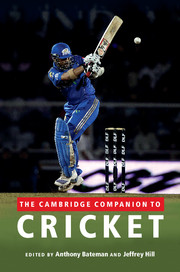Book contents
- Frontmatter
- Introduction
- 1 Cricket pastoral and Englishness
- 2 Cricket in the eighteenth century
- 3 Corruption in cricket
- 4 Broadcasting and cricket in England
- 5 Bodyline, Jardine and masculinity
- 6 Don Bradman: just a boy from Bowral
- 7 The Packer cricket war
- 8 New Zealand cricket and the colonial relationship
- 9 C. L. R. James and cricket
- 10 Reading Brian Lara and the traditions of Caribbean cricket poetry
- 11 The detachment of West Indies cricket from the nationalist scaffold
- 12 The Indian Premier League and world cricket
- 13 Hero, celebrity and icon: Sachin Tendulkar and Indian public culture
- 14 Conflicting loyalties: nationalism and religion in India–Pakistan cricket relations
- 15 Cricket and representations of beauty: Newlands Cricket Ground and the roots of apartheid in South African cricket
- 16 Writing the modern game
- 17 Cricket and international politics
- Further reading
- Index
4 - Broadcasting and cricket in England
Published online by Cambridge University Press: 28 September 2012
- Frontmatter
- Introduction
- 1 Cricket pastoral and Englishness
- 2 Cricket in the eighteenth century
- 3 Corruption in cricket
- 4 Broadcasting and cricket in England
- 5 Bodyline, Jardine and masculinity
- 6 Don Bradman: just a boy from Bowral
- 7 The Packer cricket war
- 8 New Zealand cricket and the colonial relationship
- 9 C. L. R. James and cricket
- 10 Reading Brian Lara and the traditions of Caribbean cricket poetry
- 11 The detachment of West Indies cricket from the nationalist scaffold
- 12 The Indian Premier League and world cricket
- 13 Hero, celebrity and icon: Sachin Tendulkar and Indian public culture
- 14 Conflicting loyalties: nationalism and religion in India–Pakistan cricket relations
- 15 Cricket and representations of beauty: Newlands Cricket Ground and the roots of apartheid in South African cricket
- 16 Writing the modern game
- 17 Cricket and international politics
- Further reading
- Index
Summary
No survey of cricket in England since the Second World War would be complete without a discussion of its relationship with broadcasting. Radio and television have provided instantaneous reporting of top-level cricket. The leading commentators have been among the game's star personalities and, while most have specialised in one medium, they have usually worked in both radio and television. The BBC has always dominated radio coverage of cricket and had a near monopoly of televised cricket until the 1990s. But radio and television have presented differing images of cricket and have had different impacts on its organisation and finances. Radio has done more to reflect the traditional atmosphere of cricket while television has done more to stimulate change in cricket.
The scale of cricket broadcasting
The scale of cricket broadcasting has reinforced cricket's standing as one of England's leading sports. Given the relatively small numbers who attend matches, one can argue that broadcasting has exaggerated the significance of cricket. BBC radio match coverage started in 1927 and by the end of the 1930s it broadcast cricket for more hours than any other sport. Since the start of Test Match Special (TMS) in 1957, which has provided live commentary on every ball of Test matches played in England, cricket has probably been the sport broadcast for most hours on national radio, while local radio also has extensive coverage. The BBC coverage of the England– Australia Test at Lord's in 1938 was the first cricket match broadcast by television anywhere in the world.
- Type
- Chapter
- Information
- The Cambridge Companion to Cricket , pp. 55 - 69Publisher: Cambridge University PressPrint publication year: 2011
- 2
- Cited by



